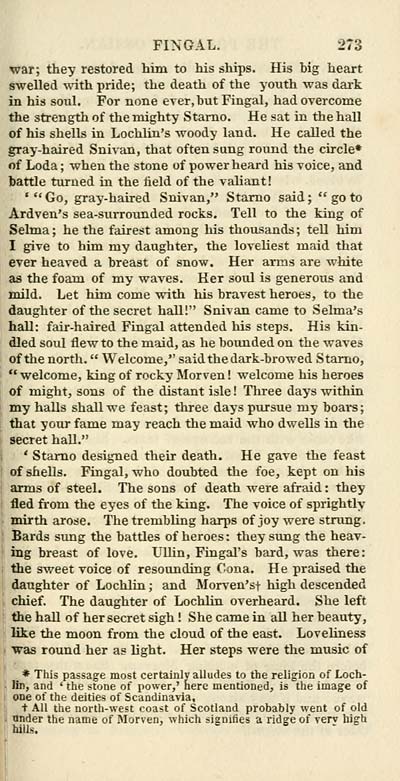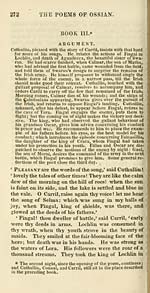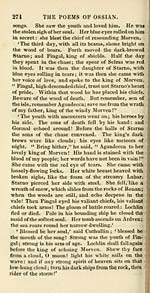Ossian Collection > Poems of Ossian
(281)
Download files
Complete book:
Individual page:
Thumbnail gallery: Grid view | List view

FINGAL. 273
war; they restored him to his ships. His big heart
swelled -Rath pride; the death of the youth was dark
in his soul. For none ever, but Fingal, had overcome
the strength of the mighty Stamo. He sat in the hall
of his shells in Lochlin's woody land. He called the
gray-haired Snivan, that often sang round the circle*
of Loda ; when the stone of power heard his voice, and
battle turned in the held of the valiant!
' " Go, gray-haired Snivan," Stamo said ; " go to
Ardven's sea-surrounded rocks. Tell to the king of
Selma ; he the fairest among his thousands ; tell him
I give to him my daughter, the loveliest maid that
ever heaved a breast of snow. Her arms are white
as the foam of my waves. Her soul is generous and
mild. Let him come with his bravest heroes, to the
daughter of the secret hall!" Snivan came to Selma's
hall: fair-haired Fingal attended his steps. His kin-
dled soul flew to the maid, as he boimded on the waves
of the north. " Welcome," said the dark-browed Stamo,
" welcome, king of rocky Morven ! welcome his heroes
of might, sons of the distant isle ! Tliree days within
my halls shall we feast; three days pursue my boars;
that your fame may reach the maid who dwells in the
secret hall."
' Stamo designed their death. He gave the feast
of shells. Fingal, who doubted the foe, kept on his
arms of steel. The sons of death were afraid : they
fled from the eyes of the king. The voice of sprightly
mirth arose. The trembling harps of joy were strung.
Bards simg the battles of heroes: they sung the heav-
ing breast of love. Ullin, Fingal's bard, was there:
the sweet voice of resounding Cona. He praised the
daughter of Lochlin ; and Morven'st high descended
chief. The daughter of Lochlin overheard. She left
the hall of her secret sigh ! She came in all her beauty,
like the moon from the cloud of the east. Loveliness
was round her as light. Her steps were the music of
* This passage most certainly alludes to the religion of Loch-
lin, and ' the stone of power,' here mentioned, is the image of
one of the deities of Scandinavia,
t All the north-west coast of Scotland probably went of old
nnder the name of Morven, which signifies a ridge of verv high
hills. s . e
war; they restored him to his ships. His big heart
swelled -Rath pride; the death of the youth was dark
in his soul. For none ever, but Fingal, had overcome
the strength of the mighty Stamo. He sat in the hall
of his shells in Lochlin's woody land. He called the
gray-haired Snivan, that often sang round the circle*
of Loda ; when the stone of power heard his voice, and
battle turned in the held of the valiant!
' " Go, gray-haired Snivan," Stamo said ; " go to
Ardven's sea-surrounded rocks. Tell to the king of
Selma ; he the fairest among his thousands ; tell him
I give to him my daughter, the loveliest maid that
ever heaved a breast of snow. Her arms are white
as the foam of my waves. Her soul is generous and
mild. Let him come with his bravest heroes, to the
daughter of the secret hall!" Snivan came to Selma's
hall: fair-haired Fingal attended his steps. His kin-
dled soul flew to the maid, as he boimded on the waves
of the north. " Welcome," said the dark-browed Stamo,
" welcome, king of rocky Morven ! welcome his heroes
of might, sons of the distant isle ! Tliree days within
my halls shall we feast; three days pursue my boars;
that your fame may reach the maid who dwells in the
secret hall."
' Stamo designed their death. He gave the feast
of shells. Fingal, who doubted the foe, kept on his
arms of steel. The sons of death were afraid : they
fled from the eyes of the king. The voice of sprightly
mirth arose. The trembling harps of joy were strung.
Bards simg the battles of heroes: they sung the heav-
ing breast of love. Ullin, Fingal's bard, was there:
the sweet voice of resounding Cona. He praised the
daughter of Lochlin ; and Morven'st high descended
chief. The daughter of Lochlin overheard. She left
the hall of her secret sigh ! She came in all her beauty,
like the moon from the cloud of the east. Loveliness
was round her as light. Her steps were the music of
* This passage most certainly alludes to the religion of Loch-
lin, and ' the stone of power,' here mentioned, is the image of
one of the deities of Scandinavia,
t All the north-west coast of Scotland probably went of old
nnder the name of Morven, which signifies a ridge of verv high
hills. s . e
Set display mode to: Large image | Transcription
Images and transcriptions on this page, including medium image downloads, may be used under the Creative Commons Attribution 4.0 International Licence unless otherwise stated. ![]()
| Early Gaelic Book Collections > Ossian Collection > Poems of Ossian > (281) |
|---|
| Permanent URL | https://digital.nls.uk/81241241 |
|---|
| Description | Selected books from the Ossian Collection of 327 volumes, originally assembled by J. Norman Methven of Perth. Different editions and translations of James MacPherson's epic poem 'Ossian', some with a map of the 'Kingdom of Connor'. Also secondary material relating to Ossianic poetry and the Ossian controversy. |
|---|
| Description | Selected items from five 'Special and Named Printed Collections'. Includes books in Gaelic and other Celtic languages, works about the Gaels, their languages, literature, culture and history. |
|---|

